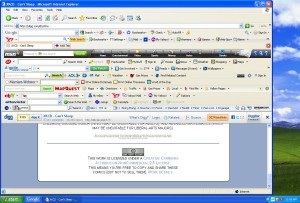
1: My computer is slow
The most common problem of all. A slow computer can cause many frustrations, but fortunately there is something you can do yourself before you replace it. There may be several reasons for a slow computer; however, the most common is lack of maintenance. Fragmented data, a corrupted registry, spyware and dozens of unnecessary programs running at the same time, easily eat at the speed and performance of your PC.
2: My computer freezes
Also a common problem, but it is far more serious than a slow PC. In most cases it is caused by viruses, especially spyware that has been installed on your computer. It can enter via a click on a link to a fake website from an email or so on. Often the email is being sent from what looks like your bank, Paypal, Facebook or similar. Last year MYSecurityCenter registered an increase in malware infections coming from Facebook-related fraudsters among their customers.
The problem can also be caused by hardware – perhaps some memory you just installed – or recent software updates, including Windows Update.
3: I forgot to backup my data
Unfortunately, backup is still an overlooked security task for many home users – until the day it is too late. Important documents, photos, music libraries and emails are automatically stored on your computer’s hard drive, which is a mechanical and electrical device. When it breaks down (and it is when, not if) this data will disappear forever. Even if you have a warranty from the hard drive manufacturer, it does not cover your data, it only replaces the hard drive with a new one.
4: I get bombarded with adware and my home page has changed
Many do not notice that they often accept a new toolbar when they download free programs such as Adobe Reader. For example Adobe Reader now offers the Google Chrome internet browser as part of its download. Whilst Adobe and Google are reputable companies, other free downloads may install toolbars or other applications that can contain malicious code that hijacks your browser and changes all the settings. So your home page for example is changed to another website that you can’t then change back. At the same time, annoying pop-up messages with advertisements for products you’ve never asked for are constantly displayed on screen every time you try to browse the internet.
5: I cannot get online
Internet connection problems can be caused by many different things. The most common are incorrect network configurations, hardware or software errors in the router, latency from your Internet Service Provider, incorrect IP address configuration, incorrect connection of network cables, firewall applications that block http traffic from your PC or temporary timeouts your ISP.
Check out our support plans by clicking HERE! Box Support provides ongoing computer support, whenever you need it.
6: My computer turns off by itself
Typically this is due to dying power supply, bad cable connections, defective battery or overheating when the computer shuts down by itself to cool down.
7: My smartphone will not sync with my PC
In order to ensure backup of your smartphone, it is important that you regularly sync your phone content with your computer. When synchronization does not work as expected may be due to various factors, depending on the type of smartphone and PC. Sometimes it is required that all programs are closed, during syncing or backup.
8: My wireless network is unstable
An unstable wireless network is a very common problem. It can be caused by everything from radio waves that interfere with the signal to the router’s location in the home or outdated network drivers.
9: I cannot print from the web
Most of us have had the need to print tickets or documents that we ordered or downloaded from the web. If your computer’s pop-up blocker is turned on, this can cause you to not be able to print. There are also PDF documents that are rights protected by passwords and therefore not printable.
10: My computer makes strange noises
If your computer suddenly starts to buzz or vibrate, it can be due to a hardware failure. High, whining noises may indicate problems with the electrical components, while buzzing noises are often caused by lack of ventilation.



